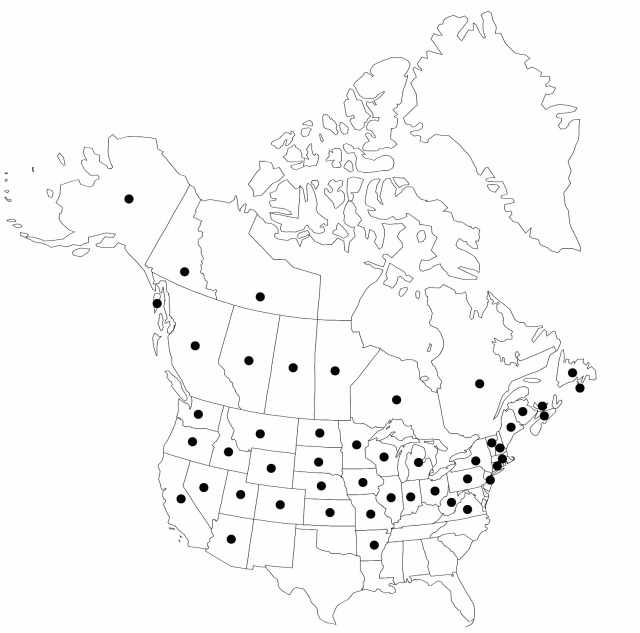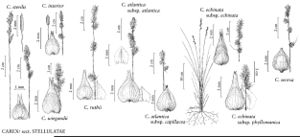Difference between revisions of "Carex interior"
Bull. Torrey Bot. Club 20: 426. 1893.
FNA>Volume Importer |
FNA>Volume Importer |
(No difference)
| |
Revision as of 21:09, 16 December 2019
Culms 10–95 cm. Leaves 3–5 per culm; sheaths tight, inner band hyaline, 1.8–13 cm, apex concave, glabrous; ligule of distalmost leaf obtuse to rounded, 0.6–2.2 mm; blades plicate, 6–31 cm × 0.6–2.4(–2.7) mm, widest leaf 1–2.4(–2.7) mm wide. Inflorescences 0.8–3.7 cm; spikes 2–5(–7); lateral spikes pistillate often with few staminate flowers proximally, 3–9.5 mm, sessile, staminate portion 3-flowered, to 2.2 mm, pistillate portion 3–18-flowered, 2.3–8 mm; basal 2 spikes 2.1–11 mm apart; terminal spike 5.2–20 mm, gynecandrous, staminate portion 3–10-flowered, 2.2–14.5 × 0.7–1.4 mm, pistillate portion 4–16-flowered, 3–7 × 4–5.8 mm. Pistillate scales ovate, 1.2–2.1(–2.4) × 1–1.6 mm, apex obtuse. Staminate scales ovate, 1.4–2.9 × 1–1.3 mm, base clavate, apex obtuse to acute. Anthers 0.6–1.4 mm. Perigynia spreading to reflexed, castaneous to dark brown, 4–12-veined abaxially, sometimes faintly, 0(–6)-veined adaxially over achene, ovate, often convexly tapered from widest point to beak, forming a “shoulder,” 1.95–3(–3.3) × 1.1–1.8 mm, 1.4–2(–2.2) times as long as wide; beak 0.4–0.95 mm, 0.18–0.44 length of body, setulose-serrulate, teeth 0.15–0.4 mm. Achenes ovate, 1.2–1.8 × 0.95–1.5 mm.
Phenology: Fruiting late spring–early summer.
Habitat: Wet meadows, wet prairies, fens, coniferous and deciduous swamps, river and lakeshores, seeps, usually in ± calcareous, open sites
Elevation: 0–2700 m
Distribution

St. Pierre and Miquelon, Alta., B.C., Man., N.B., Nfld. and Labr. (Nfld.), N.W.T., N.S., Ont., P.E.I., Que., Sask., Yukon, Alaska, Ariz., Ark., Calif., Colo., Conn., Idaho, Ill., Ind., Iowa, Kans., Maine, Mass., Mich., Minn., Mo., Mont., Nebr., Nev., N.H., N.J., N.Y., N.Dak., Ohio, Oreg., Pa., S.Dak., Utah, Vt., Va., W.Va., Wash., Wis., Wyo., Mexico (Chihuahua).
Discussion
When Carex interior occurs with C. sterilis, C. echinata, and (rarely) C. atlantica, usually sterile intermediates, presumably hybrids, may occasionally be found.
Selected References
None.
